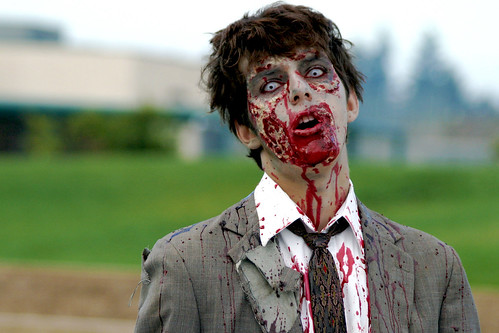Continuing our month-long Halloween theme (last week we posted about werewolf words) this week we take a word walk with the undead: zombies.
The word zombie originally referred to “a snake god or fetish in religions of West Africa and elsewhere,” and later came to mean “a person, usually undead, animated by unnatural forces (such as magic), with no soul or will of his/her own.” Its origins are either African – from the Kikongo zumbi, meaning “fetish,” or the Mbundu nzambi, meaning “god” – or, according to the Online Etymology Dictionary, it may come from a “Louisiana creole word meaning “phantom, ghost,’” which stems from the Spanish sombra, “shade, ghost.” Sombra also gives us somber and sombrero.
There are a number of different ways to refer to the living corpse. One is undead, an old word attested to the 1400s. (Bram Stoker apparently had considered naming his most famous novel The Un-Dead.) Other words include lich, a “southern dialectal survival” of the Old English lic, “body, dead body, corpse,” and revenant, a more general term for “one who returns; especially, one who returns after a long period of absence or after death; a ghost; a specter,” or a zombie. Revenant comes from the French revenir, “to return,” and is related to revenue.
The draugr is “an undead creature from Norse mythology,” and possesses superhuman strength, the ability to increase its size at will, and the “unmistakable stench of decay.” Other “zombienyms” include the living dead, as popularized by the iconic horror flick, Night of the Living Dead, and the walking dead, perhaps made popular by the television show, and the graphic novel series the show is based on.
[Photo: CC BY 2.0 by danhollisterduck]
The Walking Dead is an example of the zombie apocalypse genre, in which “a widespread rise of zombies hostile to human life engages in a general assault on civilization,” and is often caused by a plague or pandemic. Other examples include The Living Dead series, 28 Days Later, Shaun of the Dead, I Am Legend, and many more.
Think a zombie apocalypse could never happen? Think again. Cracked gives five scientific reasons why a zombie apocalypse is possible, such as the existence of brain parasites; a real life “rage virus,” also known as Creutzfeldt-Jakob disease or mad cow disease; and neurogenesis. Better be prepared and study your CDC zombie apocalypse preparedness guide (that’s right, I said: C – D – C). If you want to make peace with the zombies, you’ll want to check out How to Speak Zombie: A Guide for the Living, the Zombie Lexicon, or this primer on zombie in American Sign Language for the zombie-hearing impaired.
To calm down from zombie attacks, have a zombie cocktail, made of “rum and fruit juices.” But don’t have too many for you may want to attend a zombie walk, “an organized public gathering of people who dress up in zombie costumes,” one of which occurred last week during Occupy Wall Street, a protest against “financial greed and corruption,” including perhaps zombie banks, banks that are insolvent but propped up by government intervention. For more on zombie banks, read William Safire’s 2009 piece in The New York Times.
[Photo: CC BY 2.0 by KellBailey]
Beware the zombie lie, which according to Word Spy is “a false statement that keeps getting repeated no matter how often it has been refuted,” as well as the zombie computer, “a computer containing a hidden software program that enables the machine to be controlled remotely, usually to perform an attack on another computer,” and the zombie clause, not to be confused with the Zombie Claus, which you should probably beware of too.
In terms of grammar, you may want to ignore zombie rules, “a long list of peeves on the part of single individuals that somehow made it into grammar books and teaching materials.” The term was coined by linguist Arnold Zwicky, who writes about zombie rules here, here, and here. Mark Liberman at Language Log writes about teaching zombie rules here.
A zombie language, according to Urban Dictionary, is a constructed language made up of dead languages, such as Latin, that have been revived by enthusiasts who might wear this T-shirt. A dead language is opposed to a living language, “which is still spoken in the contemporary period.” A dead metaphor is “a former metaphor which has in effect lost its metaphorical status and become literal,” such as world wide web and mouse.
Finally, for the best engagement photos ever, look here.
Next week we’ll be sinking our teeth into vampires, though not the sparkly kind.


You folks are probably too young to remember a couple of Zombie movies from the 1930s, “White Zombie” with Bela Lugosi and “Revolt of the Zombies” (both of which I saw in the 50s, when I was a kid). White Zombie is available for instant play on that red-labeled Internet movie service.
Great additions Vic! We’ll have to check those out.
While you are putting together your post-zombie-apocalypse defense team, don’t forget your local veterinarian!! http://www.avma.org/press/releases/111031_zombie-apocalypse.asp
Thanks for this! I’m writing a book about zombies right now! This helps with my research.